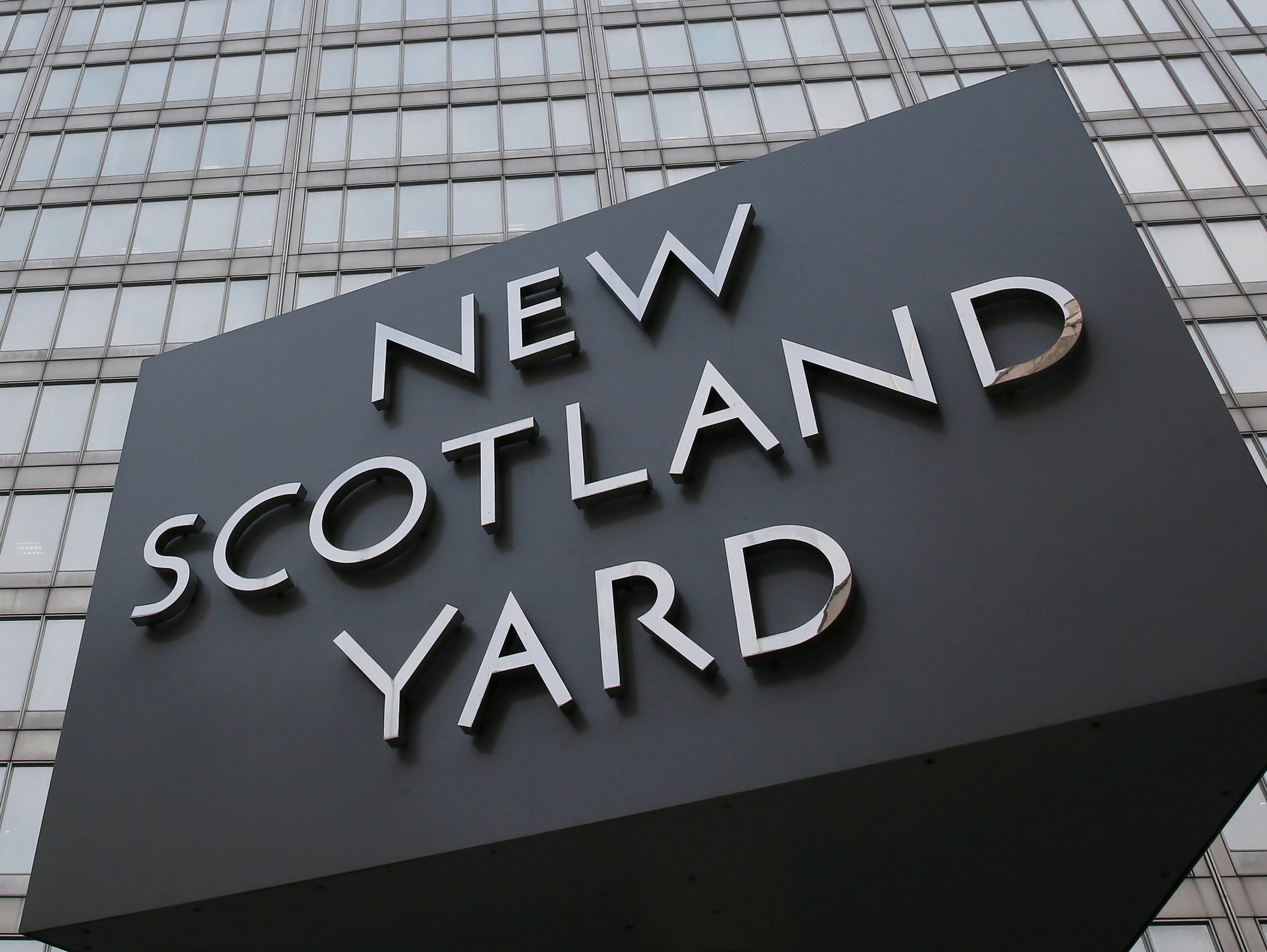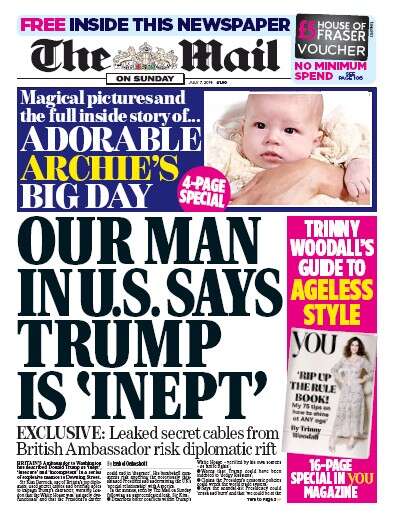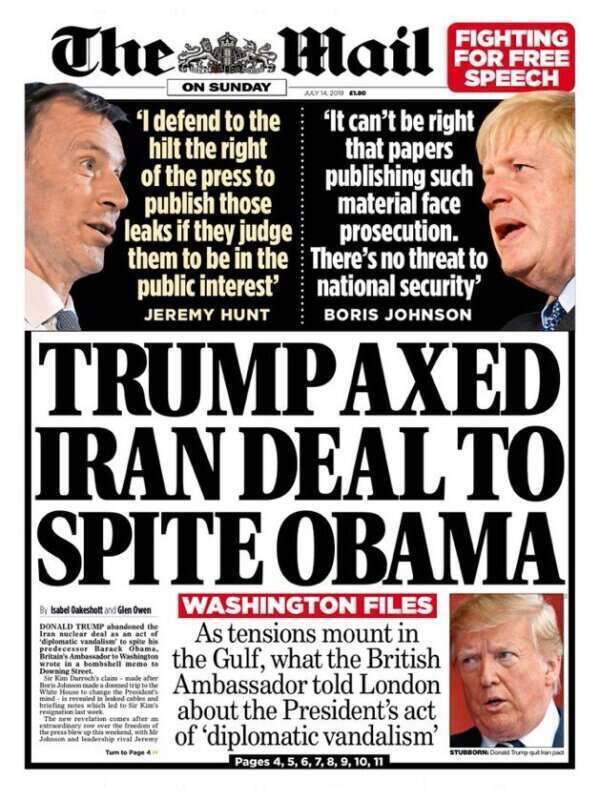
A top media lawyer has said police “shouldn’t be going there” when it comes to pursuing news publishers over “embarrassing” leaked diplomatic memos about US President Donald Trump.
The Met opened a criminal investigation on Friday after the Mail on Sunday published secret correspondence sent by British ambassador to the US Sir Kim Darroch on its front page last week.
Trump lashed out at the UK on Twitter over Sir Kim’s private claims that the US leader was “inept” and “insecure”, forcing the diplomat to step down.
Journalist Isabel Oakeshott’s source for the story is suspected of being a civil servant who police say breached the Official Secrets Act in releasing the files, which span from 2017 to the present, to the press.

Met Assistant Commissioner Neil Basu has said in a statement that publishing the leaked communications “knowing the damage they have caused or are likely to cause” may be a “criminal matter”.
He advised “all owners, editors and publishers of social and mainstream media not to publish leaked government documents that may already be in their possession, or which may be offered to them…”.
But Basu seemed to later backtrack, saying in a second statement a day later that the Met “respects the rights of the media and has no intention of seeking to prevent editors from publishing stories in the public interest in a liberal democracy”.
He added: “The media hold an important role in scrutinising the actions of the state.”
Media lawyer Gavin Millar QC, of Matrix Chambers, said under the Official Secrets Act it “isn’t generally a crime for a newspaper to publish leaked confidential state information”.
He said under section five of the 1989 act, which was brought in to update the older version that was still rooted in espionage, only a “very limited category of state information” might result in criminal liability for publishers in relation to unauthorised disclosures.
“My view in a case like that is the police and prosecution just shouldn’t be going there,” he told Press Gazette.
“If a newspaper is publishing something that has national security implications that could be valuable to the enemy or hostile states, or put lives of security operatives at risk, or discloses our intelligence operation methods, that might be a different matter, but editors and journalists are very careful and experienced about doing that sort of thing and avoid it.
“This is at a much lower level than that and I don’t think the police should be talking about prosecutions or investigations of journalists and editors in this sort of context under section five [of the Official Secrets Act].”
He said the leaked memos amounted to “tittle-tattle about the international workings of an administration and the president”.
He added: “Doubtless it’s embarrassing for the Government. Doubtless it makes things a bit awkward in the short-term in terms of our relations [with the US], but would a jury say it caused serious harm to those relations and [view] it as a criminal offence? It seems pretty unlikely.
“Should it be criminalised under section five of the Official Secrets Act? No is my view in this case.”
The MoS told Press Gazette today that it had taken the decision to publish further extracts from the cache of leaked correspondence “despite the threat of police prosecution, because a free press is vital to our democracy”.
The Sunday Times quoted security sources yesterday as saying police have identified a suspect for the leak.
The Met refused to comment when asked by Press Gazette about whether it would use anti-terror spying powers under the Investigatory Powers Act to find the source of the leak.
The Met has previously used used RIPA powers to seize journalists’ telephone records, including those of Sun political editor Tom Newton-Dunn, in order to track down the whistleblowers who revealed former Government chief whip Andrew Mitchell’s infamous “plebgate” altercation with officers outside 10 Downing Street in 2014.
The move prompted Press Gazette’s Save Our Sources campaign which won a change to the law, banning police officers from secretly obtaining the call records of journalists without first getting approval from a judge.
Millar, who represented the Sun in the “plebgate” libel trial and the BBC at the Sir Cliff Richard privacy trial, said existing journalism safeguards should defend against potential misuse of spying powers by the police in identifying the source of the leak.
“Use of those powers to identify a confidential journalist’s source is difficult to justify in law,” he said. “Of course the problem is it’s done covertly.”
He said police can legally go after journalistic sources when investigating terrorism or serious organised crime or murder – “the most serious categories of criminal offending”.
But he added: “There’s nothing like that here.
“Those safeguards should operate to prevent that. The problem of course with covert surveillance and investigations is you don’t know what’s going on at the time. Though we can bring a claim to the Investigatory Powers Tribunal afterwards and ask if it was lawful.
“This case may end up with this sort of complaint being made to the IPT. [The Met] may well have used covert powers to try and identify the Mail source, but whether that would be justifiable in this case I very much doubt it, because it’s not in that category of serious crime to enable that to be lawful.”
Millar said police can “get it wrong in their assessment” of the crime and think its “terribly serious” because it’s the Official Secrets Act, but he said: “You have to look at the information that’s being discussed – how damaging is it to the state? And they don’t seem to understand that.”
The IPT has previously ruled that Cleveland Police’s use of anti-terror spying powers to grab the call records of journalists in a bid to find the source of a leak was unlawful and breached the reporters’ human rights.
A Mail on Sunday spokesperson told Press Gazette: “We have taken the decision to publish further extracts from leaked cables sent by Sir Kim Darroch, formerly Britain’s Ambassador to Washington, despite the threat of police prosecution, because a free press is vital to our democracy.
“The media must be free to publish such information, in the public interest, as long as it does not endanger lives or national security.
“Our readers across the globe now have important information about how Britain tried, but failed, to stop President Trump abandoning the Iran nuclear deal.
“What could be more in the public interest than a better understanding of how this position was reached, which may have serious consequences for world peace?”
The paper yesterday quoted Tory leadership candidates Boris Johnson and Jeremy Hunt on declaring their opposition to media prosecutions on its front page.
It said it was “grateful for the support of leading politicians of all parties”.

Reporters Without Borders UK bureau director Rebecca Vincent told Press Gazette it was “really worrying that the Met Police’s first instinct was to criminalise the publication of information that is in the public interest”.
She added: “It is the right and role of media to publish such information.
“It’s disturbing in light of previous moves by the UK government to restrict press freedom in the interests of national security, for example the recent decision by the Home Office to green light the UK government extradition request for Julian Assange.
“It’s troubling that this move comes on the back of the global media conference that was hosted this week, at which the UK Government and others reaffirmed their commitment to media freedom and it shows that there is much more work to be done at home as we champion this issue abroad.”
Michelle Stanistreet, NUJ general secretary, said: “The police must stop making the press a target of its investigations and expecting journalists to give up their sources – journalists do not do that. The NUJ’s code of conduct makes that explicit.
“The Mail on Sunday was perfectly within its rights to publish cables sent by the former British ambassador to the US Sir Kim Darroch.”
Picture: Reuters/Stefan Wermuth
Email pged@pressgazette.co.uk to point out mistakes, provide story tips or send in a letter for publication on our "Letters Page" blog
